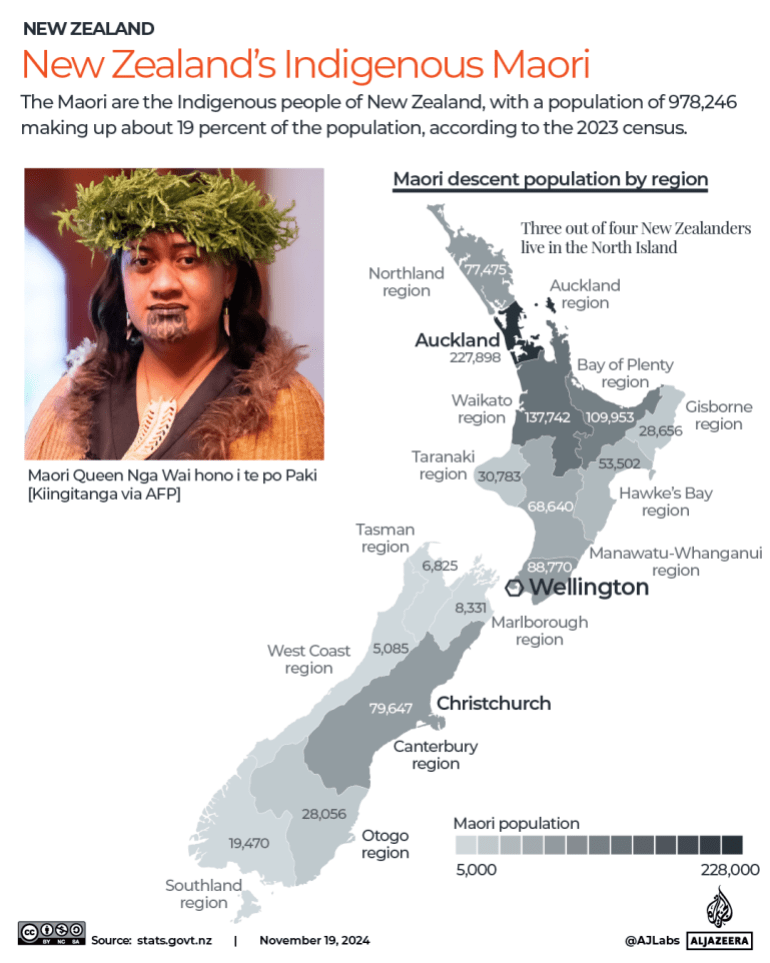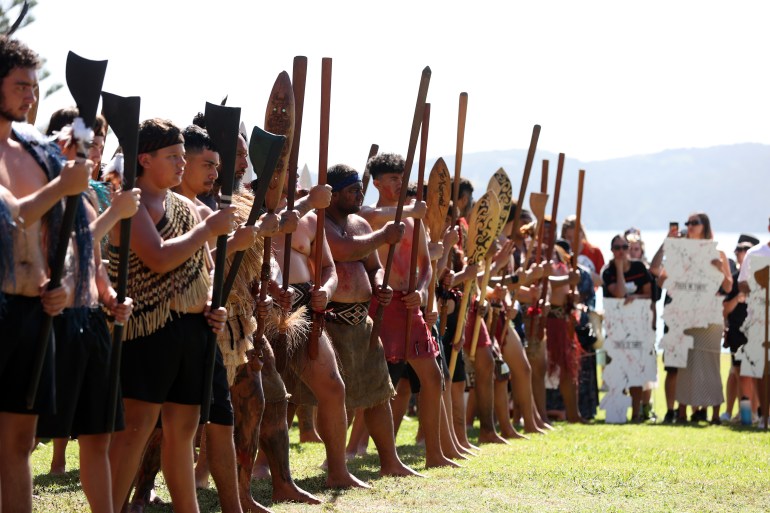A demonstration for Maori rights brought 42,000 protestors to the New Zealand Parliament in Wellington on Tuesday.
A traditional nine-day hikoi, or peaceful march, was carried out by Maori in opposition to a bill seeking to reinterpret the Treaty of Waitangi, signed between British colonizers and the Maori people 184 years ago.
Prior to the conclusion of the protest on Tuesday, demonstrators had peacefully gathered outside the Parliament building for nine days.
The controversial Treaty Principles Bill was presented for a preliminary vote on November 14, leading to Maori parliamentarians performing a haka to disrupt the process momentarily.
But what exactly is the Treaty of Waitangi, what changes are being proposed, and why has it sparked protests in New Zealand?
Who are the Maori?
The Maori are the original inhabitants of New Zealand, having inhabited the islands for many centuries.
Arriving from East Polynesia in the 1300s, the Maori developed their own unique culture and language over hundreds of years of isolation on the uninhabited islands, known as Aotearoa by the Maori.
New Zealand eventually gained independence from Britain in 1947, after decades of Maori suffering at the hands of colonial settlers.
Currently, there are 978,246 Maori in New Zealand, making up approximately 19 percent of the country’s population of 5.3 million.

What was the Treaty of Waitangi?
Signed in 1840 between the British Crown and around 500 Maori chiefs, the Treaty of Waitangi marked the founding of New Zealand as a British colony.
Despite differences between its English and te reo Maori versions, the treaty guaranteed certain rights to the Maori people, including self-determination and the protection of their lands.
Over the years, the treaty has been breached, leading to land seizures and injustices against the Maori people.
The Waitangi Tribunal was established in 1975 to address treaty breaches and provide restitution for Maori grievances.
What does the Treaty Principles Bill propose?
Introduced by Member of Parliament David Seymour, the bill seeks to redefine the treaty’s principles to apply equally to all New Zealanders, regardless of ethnicity.
Critics argue that the bill undermines Maori rights and erodes the treaty’s original intent.
Despite its controversial nature, the bill is unlikely to pass due to widespread opposition from both political parties and the Maori community.

Why is the bill so controversial?
The bill has faced strong opposition from various political parties and the Maori community for its perceived threat to Maori rights and the Treaty of Waitangi.
Experts and historians believe the bill redefines established understandings of the treaty’s principles and could result in significant breaches of the treaty’s core values.
Despite the controversy, the bill is unlikely to pass due to lack of support from key coalition partners and opposition parties.
What process must the bill go through now?
For the bill to become law in New Zealand, it must go through multiple rounds of parliamentary voting, with at least 62 votes needed for passage.
Given the current political landscape and opposition to the bill, its chances of becoming law are minimal.
While the bill may have been tabled for discussion, it is unlikely to progress further due to lack of support from coalition partners and opposition parties.
Is the bill likely to pass?
According to experts and political analysts, the bill faces insurmountable opposition and is expected to fail in subsequent rounds of parliamentary voting.
Despite its introduction, the bill is unlikely to garner enough support to become law, given the widespread criticism and opposition it has received.
Therefore, the chances of the bill passing are considered to be extremely low.
Why are people protesting if the bill is doomed to fail?
Protests against the bill are not just about its potential passage but represent broader discontent with the coalition government’s policies affecting Maori rights.
Many Maori feel that the government’s actions are undermining their rights and cultural heritage, leading to widespread dissatisfaction and unrest.
Despite the bill’s anticipated failure, the protests serve as a statement against perceived injustices and threats to Maori rights and identity.




